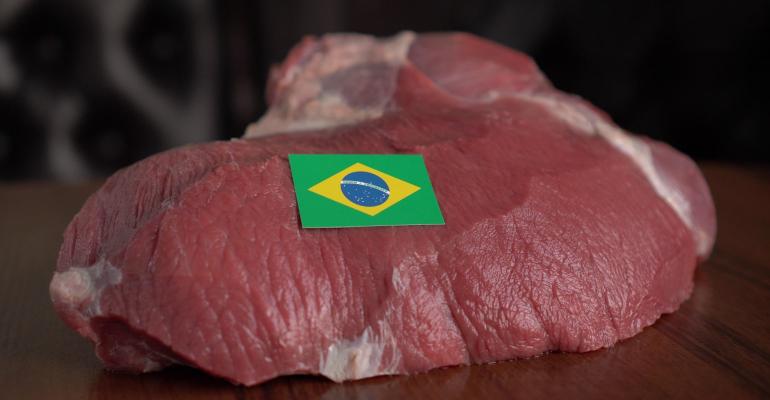Tester introduces bill to halt Brazilian beef imports
Cattle groups support legislative approach to restricting Brazil imports due to BSE concerns.

Following repeated issues with delayed reporting of bovine spongiform encephalopathy – BSE - in Brazilian beef, Sen. Jon Tester, D-Mont., introduced legislation to suspend Brazilian beef imports to the United States until experts can conduct a systematic review of the commodity’s safety.
The bill follows a united call from major beef industry groups for USDA to take the action of halting Brazilian imports.
“Montanans demand the highest level of safety and certainty in their beef, and Brazilian imports aren’t making the cut,” says Tester. “Folks expect their beef to have been rigorously tested against the strictest of standards, and concerns about Brazilian imports not only jeopardize consumer trust but present a serious risk to Montana producers. We owe it to our domestic producers and consumers to halt Brazilian imports until we can guarantee their beef and reporting standards are making the grade.”
On September 3, 2021, Brazil announced two cases of atypical BSE that were detected in June of the same year. Most countries report similar cases to the World Organization of Animal Health – OIE - immediately – with both the United Kingdom and Germany this year reporting cases to OIE within days of their occurrence earlier this year – but Brazil reported its cases more than 2 months after the fact, breaking trust with the OIE and global trading partners. This has been a routine occurrence, with Brazil also waiting months or even years to report similar cases in 2019, 2014, and 2012.
Related: Cattle groups call for halt of Brazilian beef imports
Brazil enjoys preferential market access on the global stage due to its designation as a “negligible risk” exporter by OIE. While rare, one-off instances of atypical BSE do not necessarily indicate systemic issues with the health of Brazilian cattle herds, repeated delays in reporting suggest an overly lax food safety regime and raise concerns about the reporting of additional dangerous diseases such as foot-and-mouth disease, African swine fever and avian influenza.
Tester's bill would ensure that Brazilian beef is safe to eat before it is brought back into U.S. markets by imposing a moratorium on Brazilian beef until a group of food safety and trade experts has made a recommendation regarding its import status. The legislation is supported by the U.S. Cattlemen’s Association, the National Cattlemen’s Beef Association, and R-CALF USA.
“We cannot wait for an endemic animal disease to reach our borders before we take action,” says Leo McDonnell, director emeritus at USCA. “There is a clear and present threat associated with the importation of Brazilian beef imports that we need to halt immediately. Further, the establishment of a working group will allow all stakeholders of the U.S. beef and cattle industries to have a voice in evaluating the threat to American producers and consumers posed by beef and beef products imported from Brazil. USCA thanks Senator Tester for his ongoing efforts to suspend beef trade with countries that pose a risk to the health of the domestic cattle herd.”
“U.S. cattle producers have a longstanding track record of meeting USDA’s rigorous oversight standards in order to promote public health, food safety, animal health and well-being – and any country who wishes to trade with the United States must be held to those same standards,” states Ethan Lane, NCBA vice president of government affairs. “We appreciate Senator Tester’s leadership on this important issue and look forward to working with him and this administration to hold Brazil accountable.”
"The same concerns which prompted USCA to call for a halt to Brazilian beef imports in 2017 remain today," says USCA Trade Committee Chair Larry Kendig. "Put simply, Brazil is a bad actor in the global marketplace. The country has a history of corruption at the highest levels, and we are gambling with the health of the domestic cattle herd each time we accept a shipment of beef from Brazil."
Brazil has a history of other serious beef safety infractions, including the widely reported beef export scandal in early 2017 in which Brazil was found to be exporting rotten and tainted beef. The scandal eventually led to then Agriculture Secretary Sonny Purdue’s decision to impose only a partial suspension of beef imports from Brazil. That suspension only applied to fresh beef and not pre-cooked beef, and the partial suspension did not occur until several months after the scandal was disclosed.
“What’s been clear in our years-long relationship with Brazil is that its government cannot be trusted to comply with United States’ beef import requirements. What is equally clear is that our Agriculture Secretaries are slow to respond, and may only partially respond, to known food safety threats,” says R-CALF USA CEO Bill Bullard.
He says this explains the critical importance of decisive congressional action such as that initiated by Tester to suspend all beef imports, but he said even that is not enough.
“Consumers deserve the opportunity to choose whether to continue purchasing beef from countries with sordid food safety histories, both before our slow-acting government eventually responds to infractions and after it concludes that the offending country’s corrective actions are good enough," Bullard says.
Following repeated reports that Brazilian beef exports were rotten or otherwise unsafe, Tester introduced similar legislation to assess the quality of Brazilian beef and poultry in 2019.
About the Author(s)
You May Also Like




.png?width=300&auto=webp&quality=80&disable=upscale)
